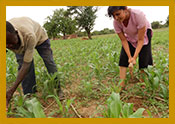 TARANGINI SAXENA TARANGINI SAXENA
Tarangini worked with Association Nourrir Sans Détruire, a partner organization of Groundswell International, to identify the lived experience of agro-pastoralist communities in eastern Burkina Faso. She focused on analyzing the contextual factors that affect livelihood and dietary choices. Using dietary diversity as a proxy measure for adequate micronutrient intake, she conducted qualitative research to determine the influence of social, economic and ecological factors on the availability and consumption of various local foods. She also conducted plant inventories, cataloging the availability of leaves, fruits, herbs, seeds and other forage-based foods both in the wild and in the market.
|